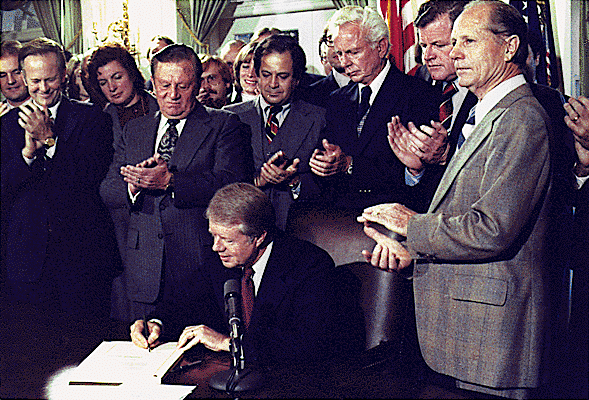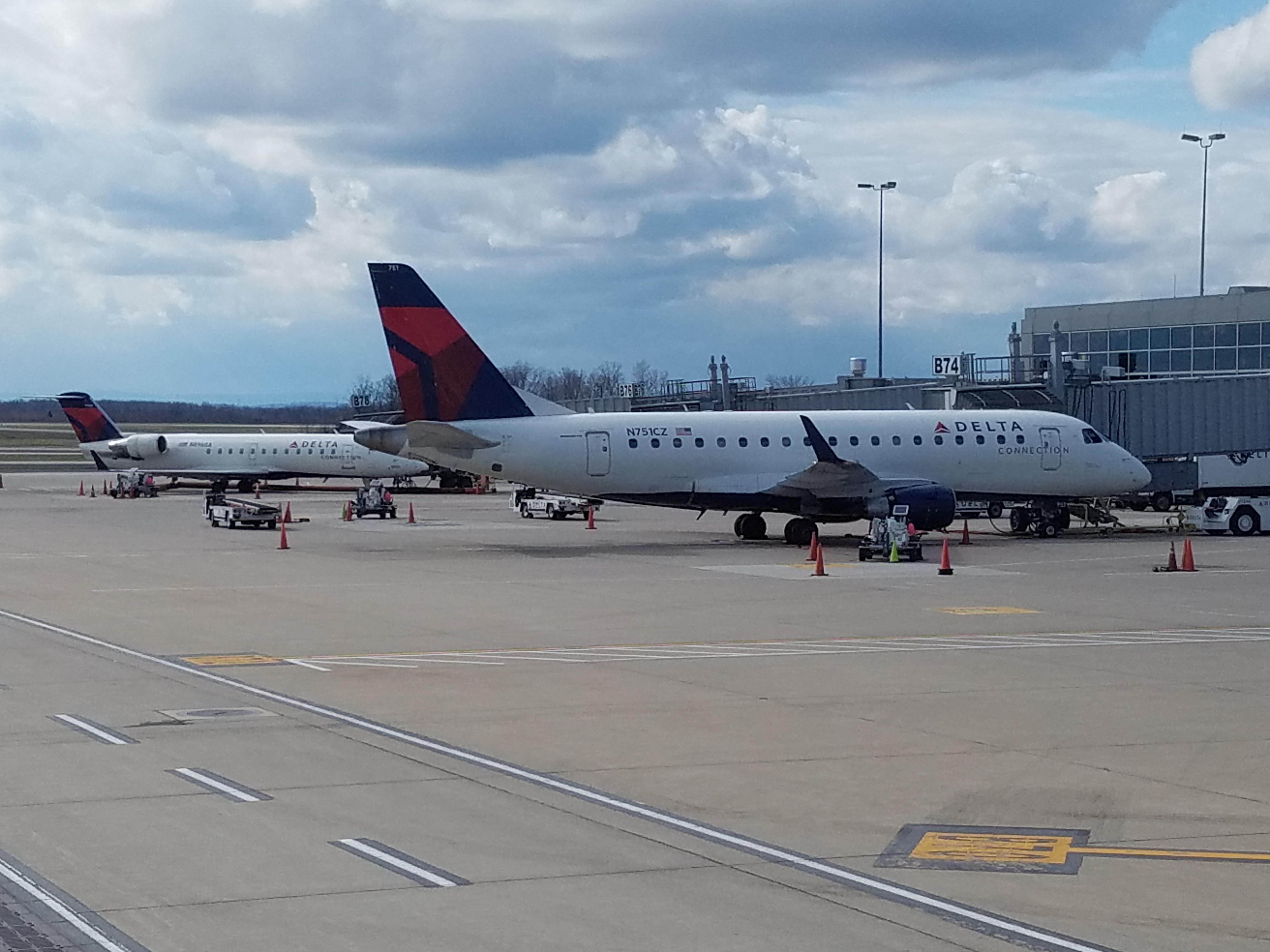A reader left the following comment about the United incident from last week where a passenger was dragged off a plane and bloodied.

I proceed assuming she’s blaming Ronald Reagan for deregulation (rather than Reagan’s Treasury Secretary and later Chief of Staff Don Regan).
The Airline Deregulation Act was passed in 1978 during the Carter administration. It was championed by Senator Ted Kennedy and Stephen Breyer as a pro-consumer move against a big business-government cartel. The airline industry largely opposed deregulation (United and Frontier were in the minority in support.)

President Carter signs the Airline Deregulation Act, by Jack E. Kightlinger (Public domain)
Deregulation largely meant that airlines would set their own schedules and prices. The regulated era largely protected the profits of airlines. Airlines remain heavily ‘regulated’ with nearly all U.S. airports owned by governments; security performed by the federal government in nearly all airports (and supervised by the federal government where it’s contracted out); air traffic control managed by government; and safety overseen by government.
Involuntary denied boardings are down substantially since deregulation (from ~ 150,000 per year to 46,000 per year, despite many more passengers flying).

If you want to blame someone for airlines calling police on passengers to deal with their overbooking issues, then look to the past 16 years – the Bush 43 and Obama administrations — expanding the security state in aviation such that airlines turn customer service matters over to law enforcement. Any challenge to a crew member is treated as a crime. Law enforcement goes along with this.
But if you’re going to lay blame on “deregulation” you should know what it is — and who did it.


Oh I figured that everyone would just blindly blame Trump. I didn’t know we could still blame Reagan for everything 🙂
“Any challenge to a crew member is treated as a crime. Law enforcement goes along with this.”
Unless this issue is problem is solved, service will not get any better.
Well, we do need more regulation. For example: if an airline charges change fees, then they should not overbook flights as well. It should be one or the other. The whole justification for a change fee is to compensate the airline for the trouble in managing their inventory (they might not be able to sell the seat again etc). There is then no need to sell the seat again, as the seat was bought and if the customer wants to change and free up the seat, they have to pay the $200-300. AND the airline can then still try to sell the seat again after the change was made.
On the other hand, if they are overbooking their flights, then there is no need for a change fee — after all, cancellations will be welcome news for them.
This seems common sense to me. Overbooking is the root cause for so many airline horror stories. The very idea that you could purchase a ticket and still not get on the flight is scandalous. I fly 150k miles a year on various carriers and am not new to flying – I know that overbooking is common practice but it enrages me every single time I encounter it.
I’m not sure if all airlines overbook their flights, but I have not heard about this happening a lot on Lufthansa or ANA for example. It seems that US carriers are always pushing the envelope on this?
There just needs to be a balance. I believe airlines should be able to run their business as they see fit and choose not to transport who they choose and call security on whomever they want. However, if they choose to make poor decisions, along with the PR nightmare, there should be stricter consequences. I don’t think 4x the one way fare is enough, especially if they can pick and choose whose on the lowest fare. Make IDB a flat $2K? $3K? $4K? That will do several things: force the airline to become more efficient and avoid an IDB, make the passenger happy and better compensated, while still giving the airline the option to IDB if they really so need to in order to prevent a whole plane from going out.
Everybody forgets that the idea of deregulation began with Nixon, through the Ford administration and was signed by Carter. If anyone gets blame, it is Professor Alfred Kahn, the father of airline deregulation.
“The idea of deregulation” hardly began with Nixon. And to suggest deregulation generally, rather than airline deregulation, ‘spreads the blame’ (or the credit) is ludicrous.
Yeah, perhaps I generalized, but not a bad memory for being a pre-teen.
They want their and to eat it too.
The bigger issue isn’t so much deregulation, but rather the fact that the airline industry has been allowed to consolidate to the point that the major airlines have a limited monopoly that completely obliterates the sorts of checks and balances usually imposed by a free market. I laughed at the people who said they were never going to fly United again, not because I don’t believe them (although for many that will be hard), but at the notion that United is somehow an outlier in terms of poor customer service. The airlines have no incentive to compete with other airlines from a service standpoint because they know people often won’t have any other choice but to fly them on certain routes. Unless you exclusively travel between a few cities in this country (NYC, Chicago, LA, Boston, Orlando and DC are the main ones that come to mind) you have very little real choice as to what airline you are going to fly if you want an efficient route at a convenient time. The airlines never should have been authorized to consolidate as much as they did.